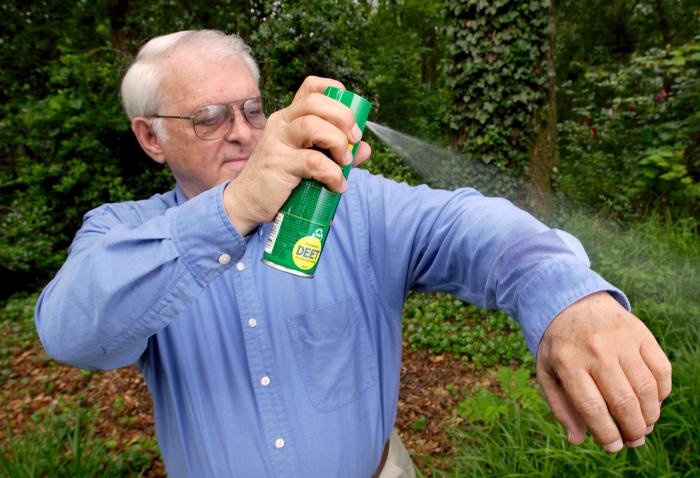Mosquitoes
Information about mosquitoes and preventing West Nile

Mosquito bites can be more than just annoying and itchy. They can make you really sick.
Here's some steps Pregnant Women can take to protect themselves from mosquito-borne illnesses.
Zika virus
For the latest information available regarding Zika virus, click here. Information is also available in Spanish.
Prevent Bites with the "4 D's"
DRAIN--Mosquitoes breed in water! Drain any standing water in your yard each week. Bird baths, clogged gutters and kiddie pools are common breeding sites.DRESS--Wear lightweight, long-sleeved shirts and long pants while outdoors.  Spray clothing with insect repellent, since mosquitoes can bite through clothing.
Spray clothing with insect repellent, since mosquitoes can bite through clothing.
 Spray clothing with insect repellent, since mosquitoes can bite through clothing.
Spray clothing with insect repellent, since mosquitoes can bite through clothing.DEET--All day, every day: Whenever you are outside, use insect repellent that contains DEET, picaridin or oil of lemon eucalyptus. Apply insect repellent sparingly to exposed skin. Use an approved repellent according to its label.
DAWN/DUSK--Limit time spent outdoors at dawn or dusk, when mosquitoes are most active and feeding.
The Department of Health wants you to Fight the Bite - The 4 D's
Here's some steps Pregnant Women can take to protect themselves from mosquito-borne illnesses.
Mosquito-Proof Your Home
- Install or repair screens on windows and doors to keep mosquitoes outside. Use your air conditioning, if you have it.
- Help reduce the number of mosquitoes around your home by emptying standing water from flowerpots, gutters, buckets, pool covers, pet water dishes, discarded tires, and birdbaths on a regular basis. (CDC.gov) Click here for more Stormwater management information.
West Nile
West Nile virus (WNV) is most commonly transmitted to humans by mosquitoes. You can reduce your risk of being infected with WNV by using insect repellent and wearing protective clothing to prevent mosquito bites. There are no medications to treat or vaccines to prevent WNV infection. Fortunately, most people infected with WNV will have no symptoms. About 1 in 5 people who are infected will develop a fever with other symptoms. Less than 1% of infected people develop a serious, sometimes fatal, neurologic illness. (CDC.gov)The City of St. Louis does not test birds or mosquitoes for West Nile virus because it is considered to be endemic in the area. For more information about mosquitoes and West Nile virus, including ways to protect against West Nile virus, click here.
Fogging Services
The Department of Health conducts precautionary mosquito fogging to help reduce the mosquito population. If you would like your block fogged please make a service request to the City of St. Louis Citizens’ Service Bureau (CSB) below. You can also contact the CSB if you do not want fogging conducted around your property.Reporting concerns
Please contact the Citizens' Service Bureau to report vector related concerns. Reports can be made by calling (314) 622-4800, online, or via Twitter by contacting @STLCSB.
Help Us Improve This Page
Did you notice an error? Is there information that you expected to find on this page, but didn't? Let us know below, and we'll work on it.
Feedback is anonymous.